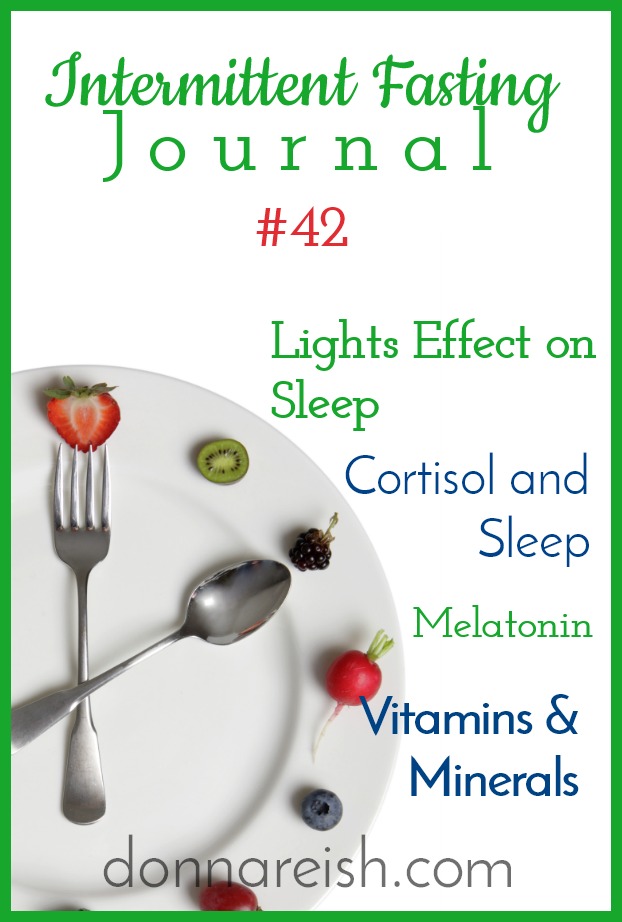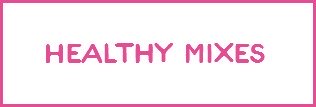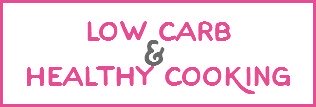
In this Broadcast, Donna Reish, blogger, author of 100 curriculum books for preschool through twelfth graders, seeker of health and fitness, and Intermittent Fasting teacher, talks about ways to improve sleep. She begins the broadcast with her and her husband’s fasting update and what she has been learning about processed foods and Appetite Correction through applying Dr. Stephan Guyenet’s The Hungry Brain teaching to fasting. Basically, she explains, seductive, processed, calorie-dense, high trigger foods do not signal AC as well, so she and her husband are learning to save these foods for dinners out and “parties” and eat less seductive foods at home—while not considering what the macros of these foods are (i.e carbs are bad or fats are bad).
Donna then digs into the topic of improving our sleep. (See Episode #40 for WHY!) She begins with steps we can take physically to improve our sleep. These include avoiding lights for the hour or two before sleep, blocking blue light from devices and televisions, exposing yourself to sunlight and Vitamin D during the day, developing good sleep hygiene (and prioritizing it even though it is difficult to do), and eating or not eating before bed.
Next, Donna digs into cortisol—the stress hormone—and how it affects sleep (and vice versa). Cortisol blocks melatonin, one of our sleep hormones, so we want to do all we can to keep cortisol levels low. She give a list of ways we can lower cortisol and some research on these ideas.
Donna discusses the sleep hormone melatonin, including how and from where it is released, when it is blocked, when it is released, and more. She explains the benefits and downfalls of supplementing with exogenous melatonin and how this can affect your energy the next day and the body’s ability to produce melatonin in the future.
Lastly, Donna introduces other sleep-related ingredients for supplementation (besides melatonin) and their effects or potential effects on sleep. These include magnesium, 5HTP, adaptogens, omegas, Vitamin D, sleep teas, and more.
This week’s broadcast is sponsored by Plexus supplements. Specifically, Donna taught about some of the Plexus supplements that include sleep-assisting ingredients. Donna is offering a FREE private FB group centered around weight management coaching and teaching for all of her wholesalers and customers in the coming year!
Get More Info!
(1) Free “Calories In/Calories Out” Game Video Series
(3) FREE One-Hour IF Webinar (last week of each month)
(4) Month-Long IF Course (daily video teaching, outlines, graphics, and more!)
(5) Private FREE FB Group where I teach each week
(6) FREE YouTube Videos–Weekly Broadcasts AND Fast Shot Teachings
(7) Weight Management Coaching and Teaching for Plexus Supplement Users
A. Our Journey
1. More real food, less processed
a. Fills us up way more
b. Saving treats for family nights
c. Working on enjoying sugar-free desserts from my blog—and fruits
d. Stephan Guyanet of Hungry Brain’s take on these processed foods
i. Seductive
ii. Calorie dense
iii. Gives many calories without as much nutrition per volume
iv. Give many calories without as much fullness or satiation since they don’t have fiber, bulk, or water
1. M and M peanut tiny handful
2. Apple whole handful with lots of water, fiber, and bulk
v. Processed foods not recognized by Appetite Correction as much
2. Picking up strength training intensity and duration
3. Weight loss slow/inch loss faster
a. Long term—need ten calories per day per pound reduction for each pound you want to lose (from the point at which you are maintaining current weight)
b. No hurry to get there with IF as the calorie reduction comes gradually—and eventually, we get to our goal weight with it
B. Physical Actions to Improve Sleep
1. Avoid light at night!
a. Black curtains, wearing something over eyes, no light from night lights and hallways
b. Don’t turn on bathroom light when you go to bathroom; use lamp or nightlight
c. Keep room cool—research shows that sleep quality gets better and insomnia is reduced in cooler room
2. Lessen blue light from computer
a. F.lux for devices will make your device give red light rather than blue light
b. Wearing blue light blocking glasses (especially if using a television too)—research shows that these completely eliminate the effects of blue light on melatonin levels!
c. Blue light especially affects the cycles of your sleep—so less quality sleep even if you sleep long if blue light is present
3. Sun exposure
a. Helps prevent insomnia
b. Helps melatonin’s cycle
c. Vitamin D is super important for reducing cortisol levels (Vitamin D3 supplement of 3000 to 5000 iu’s per day)
4. Develop good sleep hygiene
a. Try to sleep at same time each night—make a one hour time span for going to bed and rising and stick to this seven days a week (i.e. sleep between 10 and 11 pm; up between 6 and 7 am)
b. Develop evening bedtime routine (think “baby sleep” habits—warm bath, low lights, soothing music, certain things associated with sleep, etc.!)
c. Limit fluids before bed to keep from having to get up too often
d. Why is sleep hygiene so hard?
i. Feel that we deserve that free time
ii. So many needs all day, finally time with nobody needing anything
iii. Feels like a reward to stay up
iv. Reframe this—the reward is in getting to sleep!
5. Food before bed may or may not help you sleep (has no impact on weight gain unless you are eating more than you need to maintain your weight)
a. Some people can’t sleep on an empty stomach
b. Fiber or fat will stay with you through the night (satiation)
c. Carbs can satisfy your desire for certain foods and help you sleep better (satisfaction)
C. Some ways to reduce cortisol—and calm us down for sleep
1. Sleeping itself reduces cortisol!
2. Deep breathing
3. Journaling/gratitude list—am or pm
4. Yoga
5. Meditation/prayer
a. Studies of meditators’ brains show the stress area is smaller (smaller amygdala)
b. Study of medical students show meditation to decrease cortisol levels
c. Instrumental music
i. Studies show cortisol reduced in women with instrumental music and deep breathing
ii. 50% reduction in five minutes of instrumental music and deep breathing behind closed doors (longer than this had adverse effect—started thinking of their to do list!)
d. Acupuncture
e. Massage
D. Melatonin
1. General
a. Sleep hormone released from pineal gland
b. Melatonin levels increase at night, helping to synchronize the body’s clocks by telling them the sun has set
c. Light, oversleeping, daytime sleeping, and more can interfere in melatonin release and sleep
d. Opposes cortisol—when cortisol is high, melatonin is not released as much; when cortisol is low, more melatonin is released
2. Increasing melatonin naturally
a. Get on a good light and darkness schedule!
i. Controlled in part by light—getting more light in the mornings suppresses it, reducing light at night will help it increase when you need for it to
ii. Get out of the light (including blue light) one to two hours before you want to fall asleep
b. Don’t over-supplement—
i. Melatonin is a hormone
ii. Taking it in exogenously can cause a negative feedback loop where the body stops making it since you have it externally
c. Reduce stress and lower cortisol—melatonin and cortisol are opposites and not released when the other is too present (which is why stressed out people often have insomnia)
d. Work on sleep hygiene to get your “perfect sleep storm”
e. Sleep in coolness—more melatonin is released in coolness than in heat
3. Supplementing with melatonin
a. Not the same as taking a vitamin or weight loss supplement since it is a hormone!
b. You want your body to make it as much as possible
c. Actually a prescription in many countries
d. Not for kids
e. Benefits—many people do fall asleep better with it; known to reduce migraines, increase flexibility, help with bone density, and more
f. Downsides—some research shows not as effect for sleep as others (3 mg fall asleep 7 minute faster and slept 8 mins longer—use study of one!)
g. Downsides—can cause body to quit producing it very much; can cause a hangover and sleepiness due to reduced melatonin clearance from the body; vivid dreams/nightmares
h. Dose .5 o 5 mg per night (3 to 5 mg can cause hangover and fatigue the next day!)
i. Use when coming off of an erratic sleep pattern or trying to develop new ones
E. Supplements for Sleep (Besides Melatonin)
1. Magnesium—just before bed
a. Helps muscles relax so you sleep
b. Helps with melatonin release to be regulated
c. Many people are deficient in this mineral
d. Also helps with constipation (think “Milk of Magnesia”)
e. Take one that is non-GMO, plant-based, soy-free, all natural
2. 5 HTP
a. Helps increase the serotonin release
b. Do not take with anti-depressants/SSRI’s
c. Great to take with magnesium
3. Omega 3’s and fatty acids DHA
a. Omegas taken up to an hour before bed have been showed to help with sleep as the fat from them is released slowly—that fat release helps with sleep and helps with hunger the next day
b. Omega 3
1. Helps reduce inflammation
2. Great for neuroplasticity—helpful for depression
c. Need the correct ratio of 6 to 3
d. Omega 3’s reduce cortisol levels
e. Sources—wild salmon, eggs, walnuts, fatty fish, nuts with Omega 3’s rather than Omega 6
f. Supplements that are plant-based work well as long as the ratio is correct (fish ones might have mercury)
g. Bioavailable supplements best
4. Adaptogenic herbs
a. Herbs that help with stress in a non-psychomatic manner
b. Some that I take
i. L-Theanine
ii. Grains of Paradise
iii. Rhodiolo
iv. Chinese Ginseng
v. Astragalus
5. Prebiotics and Probiotics
a. Prebiotics feed good bacteria
b. Probiotics give good bacteria
c. Anti-fungals get rid of the bad bacteria
d. Prebiotic and probiotic foods
e. Fiber in fruits and vegetables
6. Theanine
a. Amino acid (building block for proteins) found in green tea
b. Used to treat anxiety, lower high blood pressure, and prevent Alzheimer’s disease
c. Helps the body produce more sleep hormones
d. Many teas that contain theanine are caffeinated, so watch for this!
7. Exercise
a. Right before sleep might keep you up
b. Two hours before bed or sooner can help you get tired and sleep well
c. Meditation/Yoga/Relaxation/Reading/Gratitude journal (not to do list!)
d. Reduces cortisol and stress
i. Exercise can increase cortisol if overdone
1. Exercise is a stress but it’s a good stress so usually not detrimental to cortisol levels
8. Mindful activities
a. Yoga, meditation
b. Physical games and activities that free your mind
c. Gratitude journal (other journals might be good in mornings)
d. 5-15 minutes
9. Inflammatory foods cause cortisol to rise—more stress equals less sleep and less sleep equals more stress!
a. Processed foods
b. Seed oils and transfats
c. Sugar
d. These cause stress and increase in cortisol.
e. Eat whole foods
10. Night teas or other drinks
a. Warm milk?
b. Sleepy time tea
c. Chamomile tea
F. Plexus Supplements With Ingredients Mentioned in This Broadcast
1. Magnesium—BioCleanse
2. 5 HTP
a. Accelerator
b. New MetaBurn!
3. Omega—Mega X
a. Plant-based
b. No fishy taste or burps
c. All omegas together in one capsule
d. Ratio of 6 and 3 is fixed for you
e. Gel caps
f. Great before bed
4. Vitamin D—X Factor Plus
a. Bioavailable vitamins
b. MTFHR-available
c. Gut health properties
5. Adaptogens—MetaBurn
6. Prebiotics—Slim XOS (Gut health Slim)
7. Probiotics
a. ProBio 5
i. Probiotic that doesn’t release until it hits the gut!
ii. Digestive enzymes
iii. Anti-fungals
b. Vital Biome –strains that impact serotonin, mood, anger, and anxiety
8. All products are guaranteed or full refund for up to 60 days (two months worth of each product!)
G. Shop or Learn More About Plexus!
1. To visit our store click HERE
2. To try a free sample of Plexus Slim Hunger Control (pink drink) click HERE
3. To view the MetaBurn Info Sheet click HERE
4. To view the MetaBurn Video click HERE
5. Helpful MetaBurn video showing how it reduces stress and cortisol levels click HERE
6. Plexus Magnesium Supplement—BioCleanse click HERE
H. Links Related to This Broadcast
1. Episode 40—The Importance of Sleep
2. Episode 41—Insomnia and Intermittent Fasting
3. Blue Light Blocking Glasses
4. Dissolvable Melatonin
5. F.lux app to block blue light
6. Cortisol Broadcasts
Below are a couple of links to books I use and love. I am an affiliate for Amazon.com. If you click on the links below I will earn a small commission. Thank you for your support of this blog!
Places to Find Me and Find Out More About Intermittent Fasting!
Sign up and play the NEW and FREE Calories In/Calories Out Game!
Subscribe to the blog and get free IF start up charts
Sign up for my month-long, step-by-step course (starts the first Monday of each month)
Join my private FB group where I teach IF!
Resources
1) “Delay, Don’t Deny” book (amazing!)
2) “The Obesity Code” book
3) “Feast Without Fear” book
4) “The Complete Book of Fasting” (Jason Fung)
5) “Appetite Correction” book
6) “9 Facts About Plexus Slim” article
9) “Fasting Inferno” blog post with fun YouTube song and lyrics!












